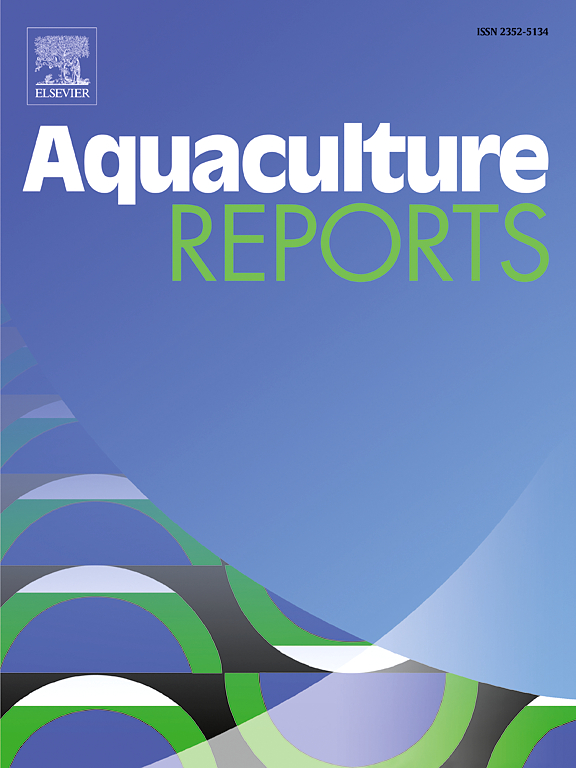雌二醇暴露对刺参脂质代谢的影响
IF 3.2
2区 农林科学
Q1 FISHERIES
引用次数: 0
摘要
脂质是重要的能量储存营养素和生殖信号分子。类固醇激素,包括雌二醇(E2),已被证明在脊椎动物的脂质代谢中起关键的调节作用。然而,对性类固醇在无脊椎动物脂质代谢中的作用知之甚少。本实验研究了外源E2对刺参雄性和雌性脂质代谢的影响。对照雌性与对照雄性相比,体壁的粗脂含量较高,而肠道的粗脂含量则不高。E2可显著降低雌性大鼠肠道和体壁总脂含量,而雄性大鼠无此作用。对日本刺参肠道代谢物和基因表达的分析表明,E2显著影响了与脂质代谢途径相关的基因表达和代谢物水平。与男性相比,女性的性激素、甘油三酯和脂肪酸代谢更为活跃。E2干扰了脂肪酸降解和甘油磷脂代谢途径。E2显著抑制体腔液过氧化氢酶(CAT)活性,推测E2可能通过靶向甘油磷脂代谢途径,诱导雄性体内氧化失衡,从而破坏脂质代谢。该研究证实,性类固醇在调节棘皮动物的生理功能方面发挥着重要作用,特别是E2可能调节脊椎动物的脂质代谢。结果还表明,外源性类固醇可以作为调节日本刺参生殖功能的工具,以改善其饲养。本文章由计算机程序翻译,如有差异,请以英文原文为准。
Effects of estradiol exposure on lipid metabolism in male and female sea cucumber Apostichopus japonicus
Lipids are important energy storage nutrients and signalling molecules for reproduction. Steroid hormones, including estradiol (E2), have been shown to play a key regulatory role in lipid metabolism in vertebrates. However, not much is known on the action of sex steroids in lipid metabolism in invertebrates. This study investigated the impact of exogenous E2 administration in lipid metabolism of male and female sea cucumber Apostichopus japonicus. Control females had higher crude lipid content in the body wall, but not in the intestines, as compared to control males. E2 administration significantly reduced the total lipid content in the intestine and body wall of females, but not males. The analysis of intestinal metabolites and gene expression of A. japonicus showed that E2 significantly affected the expression of genes and the levels of metabolites related with lipid metabolism pathway. The metabolism of sex hormones, triglycerides and fatty acids in females was more active as compared to males. The fatty acid degradation and glycerophospholipid metabolism pathways were disturbed by E2 administration in males. E2 significantly inhibited the activity of catalase (CAT) in the coelomic fluid, and it is speculated that E2 may have disrupted lipid metabolism by inducing oxidative imbalance in males by targeting the glycerophospholipid metabolism pathway. The study confirms that sex steroids play a significant role in regulating physiological functions in echinoderms and, in particular, that E2 might modulate lipid metabolism, as described for vertebrates. The results also suggest that exogenous administration of sex steroids could be used as a tool to regulate reproductive function to improve the rearing of A. japonicus.
求助全文
通过发布文献求助,成功后即可免费获取论文全文。
去求助
来源期刊

Aquaculture Reports
Agricultural and Biological Sciences-Animal Science and Zoology
CiteScore
5.90
自引率
8.10%
发文量
469
审稿时长
77 days
期刊介绍:
Aquaculture Reports will publish original research papers and reviews documenting outstanding science with a regional context and focus, answering the need for high quality information on novel species, systems and regions in emerging areas of aquaculture research and development, such as integrated multi-trophic aquaculture, urban aquaculture, ornamental, unfed aquaculture, offshore aquaculture and others. Papers having industry research as priority and encompassing product development research or current industry practice are encouraged.
 求助内容:
求助内容: 应助结果提醒方式:
应助结果提醒方式:


